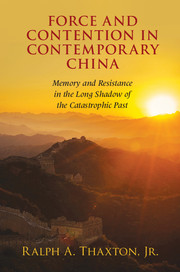 Force and Contention in Contemporary China
Force and Contention in Contemporary China Book contents
- Frontmatter
- Dedication
- Contents
- List of Illustrations
- Acknowledgments
- Cast of Characters for Da Fo Village and Several Other Villages in the Hebei-Shandong-Henan Border Area, 1945–2013
- Maps
- Introduction
- 1 The Violent Dawn of Reform
- 2 Contemporary Tax Resistance and the Memory of the Great Leap
- 3 Birth Planning and Popular Resistance
- 4 Rural Schools and the “Best Citizens of the State”: The Struggle for Knowledge and Empowerment in the Aftermath of the Great Leap
- 5 Official Corruption and Popular Contention in the Reform Era
- 6 The Rise of the Electricity Tigers: Monopoly, Corruption, and Memory
- 7 The Defeat of the Democratic Experiment and Its Consequences
- 8 Contentious Petitioners and the Revival of Mao-Era Repression
- 9 Migration and Contention in the Construction Sector
- 10 The Rise of the Martial Artists and the Two Faces of Mafia
- Conclusion: Big Questions and Small Answers from Da Fo
- Bibliography
- Index
- Miscellaneous Endmatter
2 - Contemporary Tax Resistance and the Memory of the Great Leap
Published online by Cambridge University Press: 05 August 2016
- Frontmatter
- Dedication
- Contents
- List of Illustrations
- Acknowledgments
- Cast of Characters for Da Fo Village and Several Other Villages in the Hebei-Shandong-Henan Border Area, 1945–2013
- Maps
- Introduction
- 1 The Violent Dawn of Reform
- 2 Contemporary Tax Resistance and the Memory of the Great Leap
- 3 Birth Planning and Popular Resistance
- 4 Rural Schools and the “Best Citizens of the State”: The Struggle for Knowledge and Empowerment in the Aftermath of the Great Leap
- 5 Official Corruption and Popular Contention in the Reform Era
- 6 The Rise of the Electricity Tigers: Monopoly, Corruption, and Memory
- 7 The Defeat of the Democratic Experiment and Its Consequences
- 8 Contentious Petitioners and the Revival of Mao-Era Repression
- 9 Migration and Contention in the Construction Sector
- 10 The Rise of the Martial Artists and the Two Faces of Mafia
- Conclusion: Big Questions and Small Answers from Da Fo
- Bibliography
- Index
- Miscellaneous Endmatter
Summary
In Da Fo, as in countless other Chinese villages, the Maoist Leap had ratcheted up pressure on tillers to give up more of their grain harvests to the state, resulting in a “procurement famine” of unprecedented magnitude. A pervasive memory of this state plunder and its attendant starvation persisted over the next four decades. This memory influenced popular thinking about political authority, making it difficult for post-Mao politicians to overcome the deep crisis of legitimacy they inherited. In essence, the failure of the Maoist procurement system was so profound that the Communist Party lost the authority to effectively collect taxes in much of the countryside.
The Central government relied on the mechanism of the household responsibility system (baochan daohu) to resolve this legitimacy crisis. Under this system, each farm household was to enter into a contract that gave its members the right to manage their own agricultural production. The household, in turn, was responsible for meeting a state grain quota, after which it was allowed to use the surplus however it chose. In Da Fo and much of Henan province, the obligation to pay a tax of 20 jin (0.50 kilograms) per mu (hectare) – the equivalent of a fixed land tax – was retained alongside the baochan daohu quota. Although designed to re-create Central government legitimacy by returning a degree of freedom to tillers at the same time that it gave them an incentive to increase harvest yields, the household responsibility system was highly contested in Dongle county villages.
Da Fo's farmers refused to accept the system. They harbored two fears, both of which were shaped by memories of suffering in the Great Leap famine. To begin with, they saw the baochan daohu system as a watered-down version of procurement, which had not ended with the dismantling of the communes but continued to play a role in the development of the post-Mao tax burden. The baochan daohu system required tillers to meet a quota set by the party-state before they could deploy whatever was left for their own needs. But what if the grain harvest was poor and the required quota cut into the portion of the harvest needed for basic consumption?
- Type
- Chapter
- Information
- Force and Contention in Contemporary ChinaMemory and Resistance in the Long Shadow of the Catastrophic Past, pp. 66 - 91Publisher: Cambridge University PressPrint publication year: 2016
